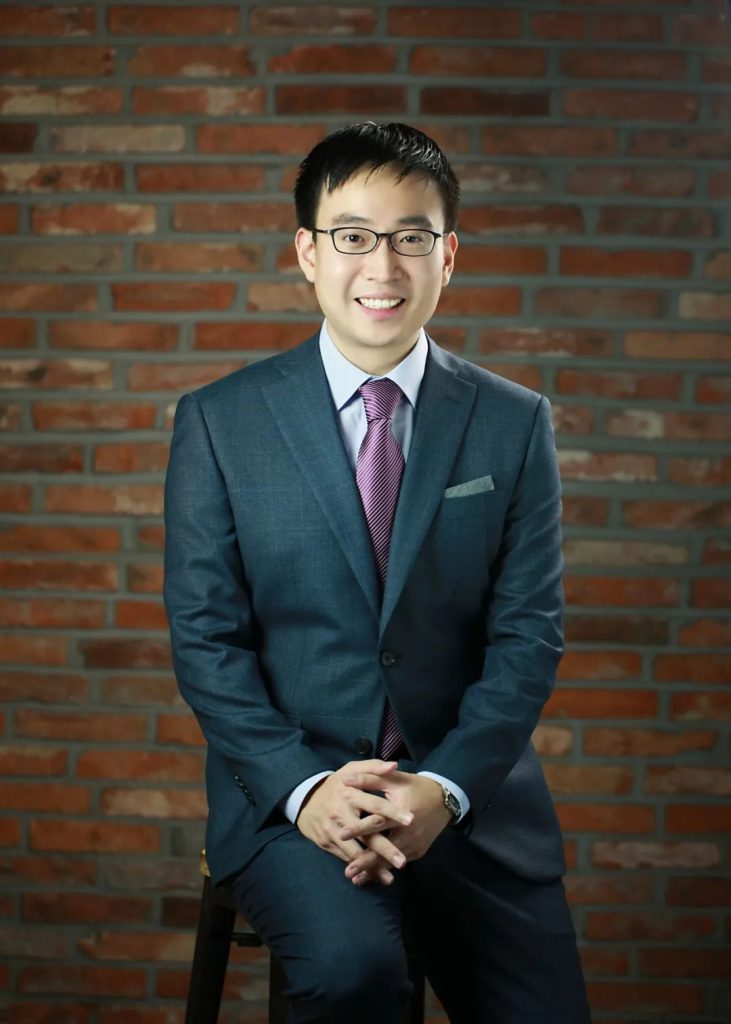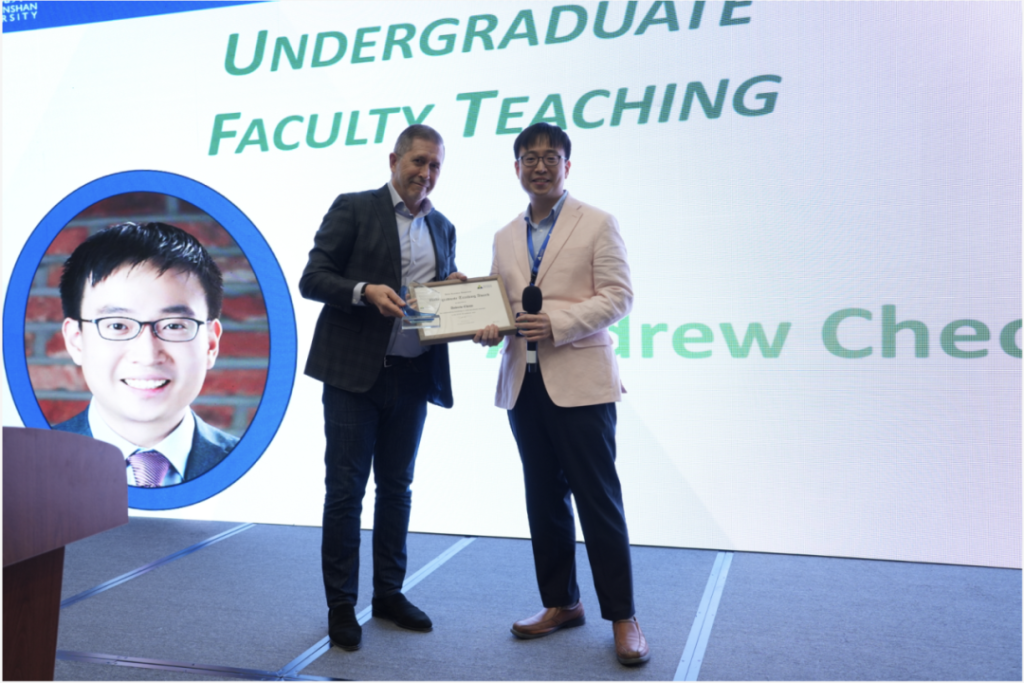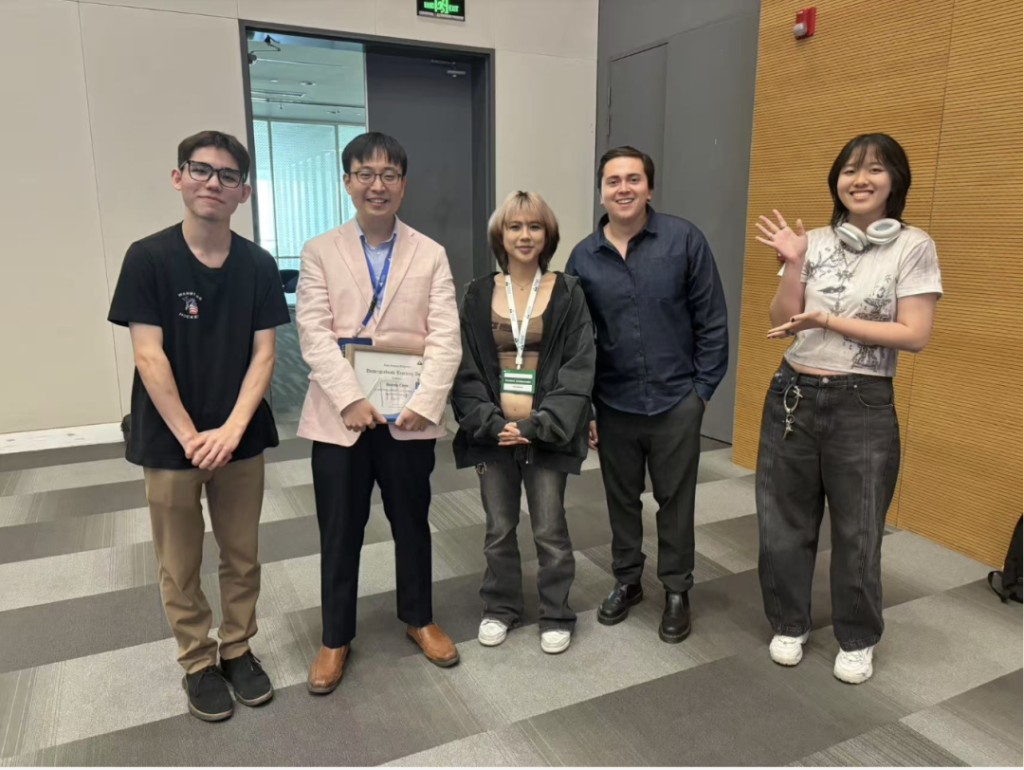
By Mengyu Ma
Dr. Andrew Cheon is an Associate Professor of International Relations at Duke Kunshan University (DKU). He taught Global Governance, International Politics, and International Politics of East Asia in the 24-25 academic year. He is the recipient of the 2025 DKU Undergraduate Teaching Award, which recognizes outstanding teaching of undergraduate courses. Recipients are nominated by students and then selected by an award committee. Dr. Cheon is the seventh recipient of this annual award and the first recipient in the Social Sciences Division.
As a Duke undergraduate alumnus, joining DKU as a faculty member felt like a natural calling for Dr. Cheon. Over the past year working with him, Dr. Cheon made an impression with his humility, intelligence, and deep reflections on teaching. In our recent conversation for this story, he reinforced my conviction that technology, while a disruptive force that is changing the landscape of higher education, will never completely replace the role of teachers. As a case in point, Dr. Cheon brings to the classroom invaluable human insights shaped by years of learning from world-class thinkers, as well as his pure passion for teaching and genuine care for students.

Structured Teaching, Shared Commitment
Students commented that Dr. Cheon’s courses are “well-organized” and “supplemented with a plethora of learning materials.” They especially appreciated the opportunity to “revise and finalize the course syllabus together in the first week of the course.”
For Dr. Cheon, being structured is about being reasonable: “When you are reasonable, students will be reasonable too. When you commit to your structure, students will commit also. And this is how you gain student trust.” He views the course syllabus and assignment rubrics as contracts—clear agreements that set expectations. Guided by this principle, he commits fully to the standards he shares with students. He finalizes the reading list on the syllabus with student input, develops a consistent weekly rhythm of three intensive reading seminars followed by a discussion or presentation day, and provides as detailed feedback as possible to explain why a higher grade hasn’t been reached and how to get there. “To leave no doubt in students’ minds when they receive their grades, we just need to take the time to be reasonable to them, and take the time to reason with them,” he insists.
In this sense, Dr. Cheon sees DKU’s 7-week session as an advantage for both students and faculty. The condensed structure makes students devote themselves more to the courses and requires faculty to be more selective with content—focusing on the most essential ideas and extracting meaningful insights. So, in refining his own courses, Dr. Cheon intentionally incorporated more active learning opportunities—such as student presentations—and updated content to reflect emerging issues in international politics.
A True Facilitator in the Classroom
Beyond his structured course design, students commented a lot on how highly engaged and “intellectually stimulated” they felt in Dr. Cheon’s classes.
“The classroom atmosphere has been nothing but pleasing, and students were highly encouraged to make contributions and ask any inquiries they may have about the materials. Every classmate (and this is not a generalization) has been an active participant in the class setting.”
When I asked Dr. Cheon for the specific classroom engagement strategies he employed, he firstly shared his mindset that has guided him through his ten years of teaching: he sees himself as a student in the classroom—learning alongside students and being honest about what he doesn’t know.
“Becoming one of the students in the classroom—someone who’s more willing to help and more frequently leads discussions—is the healthiest way to engage this generation”, Dr. Cheon explains.
He believes that traditional notions of authority in the classroom often fail, especially as consumerist culture reshapes how students perceive the teacher-student relationship. By adopting a learner’s mindset, faculty signal their commitment to learning as well. When honesty about what we know—and don’t know—becomes natural, that’s where true learning begins, and where a genuine learning community begins.
Guiding Complexity with Thoughtfulness and Care
Leading class discussions about international relations is not an easy job for Dr. Cheon—especially when “his classmates” come from diverse cultural backgrounds and are sitting in a Sino-U.S. joint-venture university in China. However, being one of them makes it smoother to navigate difficult conversations in the classroom.
As a learner who has spent more time studying this field than the others in the classroom, Dr. Cheon finds it completely natural when students bring up non-mainstream views and speak from their own perspectives. Accepting that these differences exist is the foundation of any meaningful conversation—just as people hold different positions and opinions in everyday life. Also, being respectful and more willing to listen to others not only sets an example for students but also helps each student feel heard.
Of course, Dr. Cheon—as the instructor—eventually switches the gear to focus more on the content, especially after providing sufficient background on the context in which the reading was written. But some discussions continue beyond the classroom. Dr. Cheon emphasizes that after-class time plays a crucial role in carrying forward those discussions. Some things are better addressed one-on-one—during office hours or in casual chats after class. These moments, he believes, are key to building trust with students.
Participation That Matters
No matter what topics the class covers and how the discussion goes, to help students take something meaningful away from each class, Dr. Cheon brings measurability and inclusiveness to participation through an “Online Exit Ticket.” After each class, students post a daily reflection on the course Canvas site, which counts as that day’s participation grade. Within a recommended word limit, students can share something they learned or questions they still have. Regardless of how much a student speaks in class, they receive full credit as long as they submit a meaningful reflection on time.
This low-stakes activity not only gives students incentive to reflect on their learning and to develop their metacognition but also creates space for those who may not be vocal yet to be actively engaged in thinking. As one student noted, it “genuinely fostered students’ motivation to participate in class in a gentle way.”
This strategy also enables Dr. Cheon to assign the 30% participation grade more objectively and to provide timely feedback when common issues arise. By reviewing these reflections, he can easily monitor students’ learning progress and adjust future class content or direction accordingly.
Real Worth Shows Itself without Words
As a conclusion to our conversation, I asked Dr. Cheon what shaped the educator he is today—where all the wisdom and strategies in his teaching come from. Dr. Cheon didn’t answer directly but instead gave me three names—the last of whom he had emotionally mentioned during the ceremony announcing him as this year’s teaching award recipient in late April.
The first was Professor Joseph Grieco, who introduced him to International Relations theory during his time at Duke and personally encouraged him to consider a career in the field. Professor Grieco demonstrated how faculty can guide students to think critically and creatively about scholarly work. His foresight, encouragement, and thoughtful feedback inspired Dr. Cheon to pursue an academic path in international relations.
The second was Professor Jack Snyder from Columbia University, who advised his dissertation and taught him how to channel his enthusiasm for the field into student engagement and mentorship. As a teaching assistant for Professor Snyder, Dr. Cheon learned to provide quality mentorship in large class settings through scheduled one-on-one meetings with students. Dr. Cheon says Professor Snyder, “after decades of shaping the field through his research, still responds to student emails within hours.”
The third was the late Professor Robert Jervis from Columbia University, who taught him fundamental insights about the field. As a graduate student, Dr. Cheon served as his teaching assistant for three years and practiced teaching under his guidance. Dr. Cheon remembers the sense of awe he felt whenever visiting Professor Jervis’s office. Despite his stature, Professor Jervis never made his students feel intimidated or inadequate and fostered a welcoming environment where new ideas could develop. Today, Dr. Cheon says that all of his courses “have been designed to capture some of the profound insights and wisdom Professor Jervis imparted to his students.”
Surprisingly, and perhaps not surprisingly, Dr. Cheon’s students wrote in their nominations for the award:
“He (Dr. Cheon) was able to help me figure out what I want to study at DKU.”
“Personally, Professor Cheon solidified my further commitment to academic pursuits (precisely, moving towards a Ph.D.), and has given me excellent advice as applied to challenging my current knowledge and understanding the core methodologies in the field.”

Dr. Andrew Cheon with Students.
A traditional Chinese phrase from Records of the Grand Historian (《史记》) comes to mind as I reach the end of this story:
“桃李不言, 下自成蹊。”—Peach and plum trees don’t speak, yet paths naturally form beneath them.
Thoughtful and reasonable pedagogical strategies, combined with a pure passion for teaching and a deep care for students, allow a professor to shine—quietly, lastingly, and with real worth that speaks for itself.


